Key takeaways:
- Understanding community needs requires active listening and empathy, as exemplified by personal experiences in diverse settings.
- Hospital ministry provides essential spiritual and emotional support, addressing needs often overlooked by traditional healthcare.
- Inclusivity in healthcare relies on understanding diverse experiences, emphasizing accessibility and the importance of feedback from marginalized voices.
- Building connections through storytelling and collaboration with local organizations enhances community bonds and resource sharing.
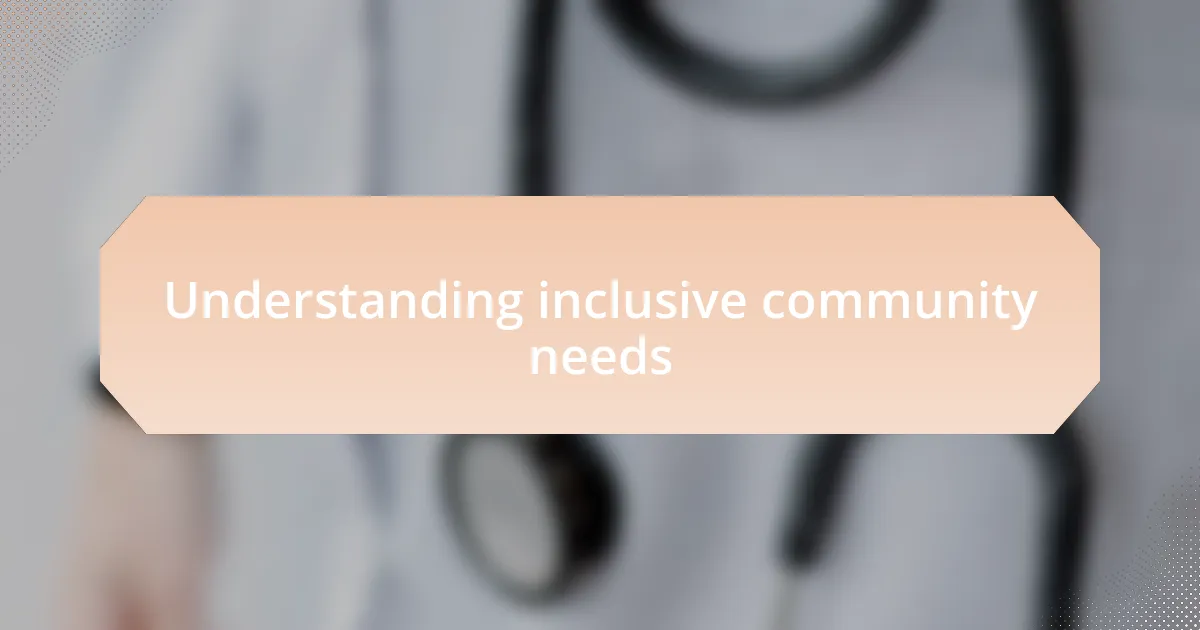
Understanding inclusive community needs
Understanding the needs of an inclusive community requires not only observation but also empathy. I recall a time when I volunteered at a local shelter, and it struck me how different our backgrounds were, yet we shared common aspirations for dignity and acceptance. Have you ever considered how a simple conversation can bridge gaps and foster understanding among diverse individuals?
Every community is unique, shaped by its people and their experiences. For instance, I once facilitated a workshop for individuals with disabilities and their caregivers. The insights shared were eye-opening; they highlighted the need for accessible spaces and inclusive activities that cater to everyone’s abilities. Isn’t it fascinating to think how small adjustments can create a welcoming environment for all?
Listening actively to the voices within the community is vital to truly comprehend their needs. On one occasion, I attended a town hall meeting where residents passionately spoke about their experiences of exclusion. It prompted me to reflect on my own biases and assumptions. How often do we overlook those voices, assuming we know what is best for others? It’s this engaged listening that can lead to genuine change and a sense of belonging for everyone.
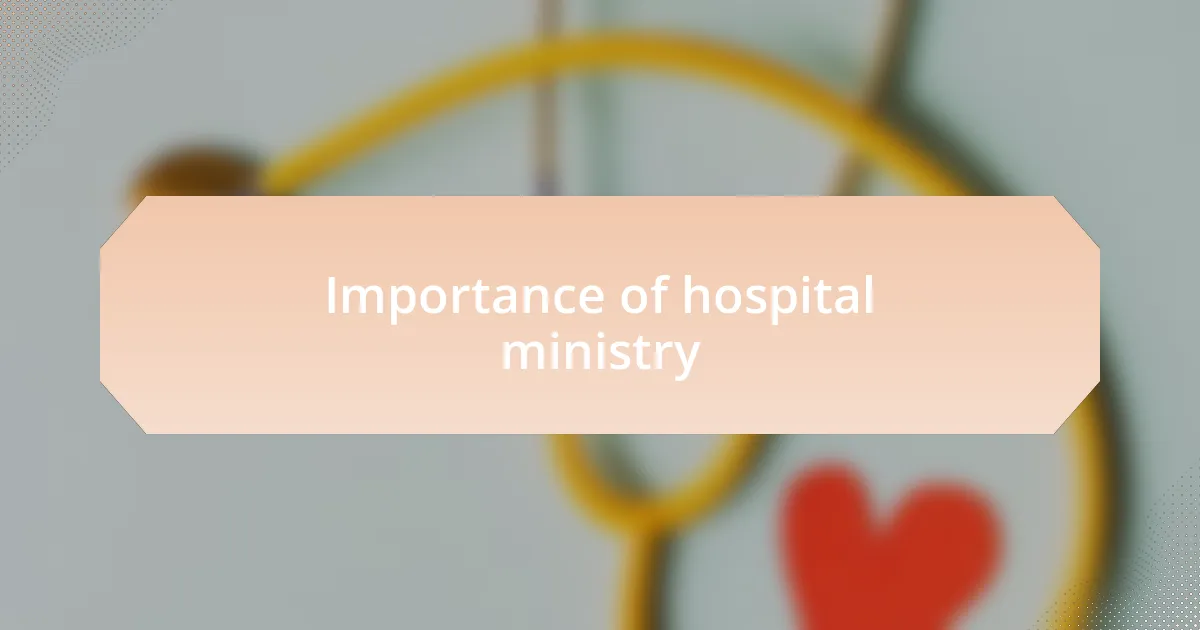
Importance of hospital ministry
Hospital ministry plays a crucial role in providing spiritual and emotional support to patients and their families during challenging times. I remember when I visited a friend in the hospital; the chaplain offered comfort not just through prayers but by simply being present. It made me wonder: how often do we underestimate the power of companionship in healing?
Moreover, hospital ministry fosters a sense of community among those experiencing vulnerability. In one instance, I witnessed a small group of volunteers coming together to host a weekly service in the hospital chapel. Their collective energy created a safe space for patients, families, and staff alike, reminding us that faith and hope can flourish, even in the most difficult circumstances.
The importance of hospital ministry also extends to addressing the spiritual needs that traditional medicine might overlook. I once encountered a patient who expressed her fear of the unknown while facing a major surgery. Through the ministry’s outreach, she found solace in conversations about her spiritual beliefs. It made me realize that this aspect of care is vital; how often do we consider the heart and soul in the path to recovery?
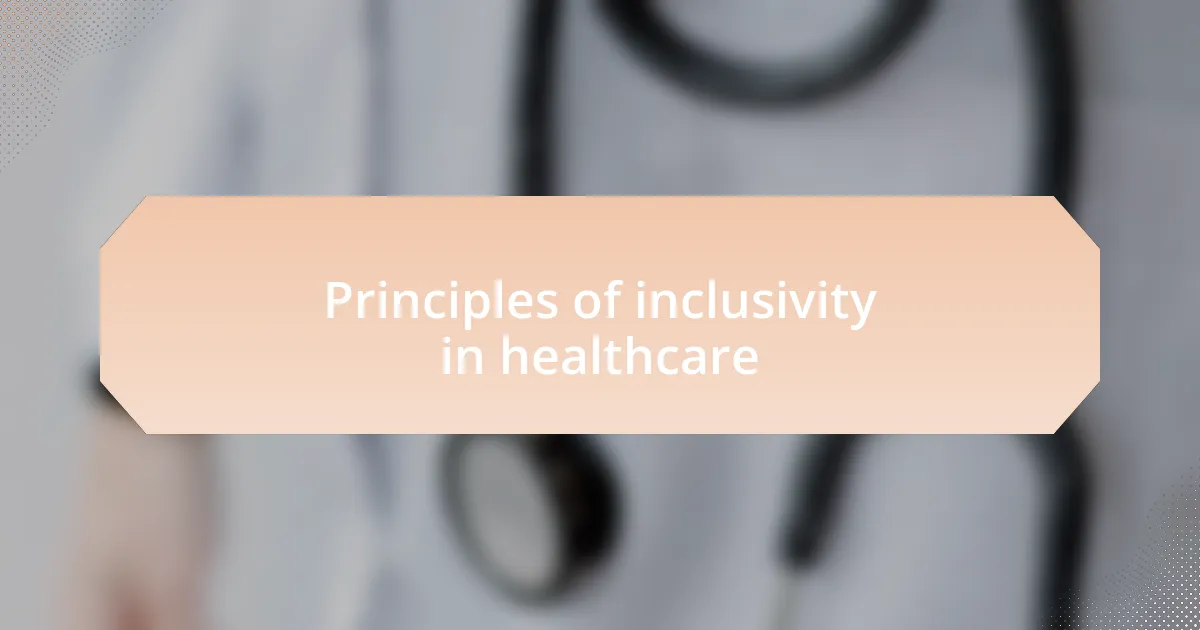
Principles of inclusivity in healthcare
Inclusivity in healthcare means recognizing and addressing the diverse needs of every individual. For instance, I recall a time when I volunteered at a community clinic that offered services in multiple languages. Seeing patients light up upon hearing their native tongue made me realize how powerful simple gestures can be in fostering trust and comfort.
Another key principle is ensuring that all voices are heard, especially the marginalized. I was once part of a focus group that included patients from various backgrounds discussing their healthcare experiences. It was eye-opening to listen to differing perspectives on care; it underscored that every story matters, and our systems must evolve to acknowledge and adapt to these unique narratives.
Lastly, accessibility is paramount. I remember visiting a local hospital that made it a priority to accommodate individuals with disabilities. It wasn’t just about having ramps or signage; they actively sought feedback from patients about their experiences. How often do we think about accessibility beyond physical structures? This approach highlighted the need for ongoing dialogue to create an environment where everyone truly feels welcome.
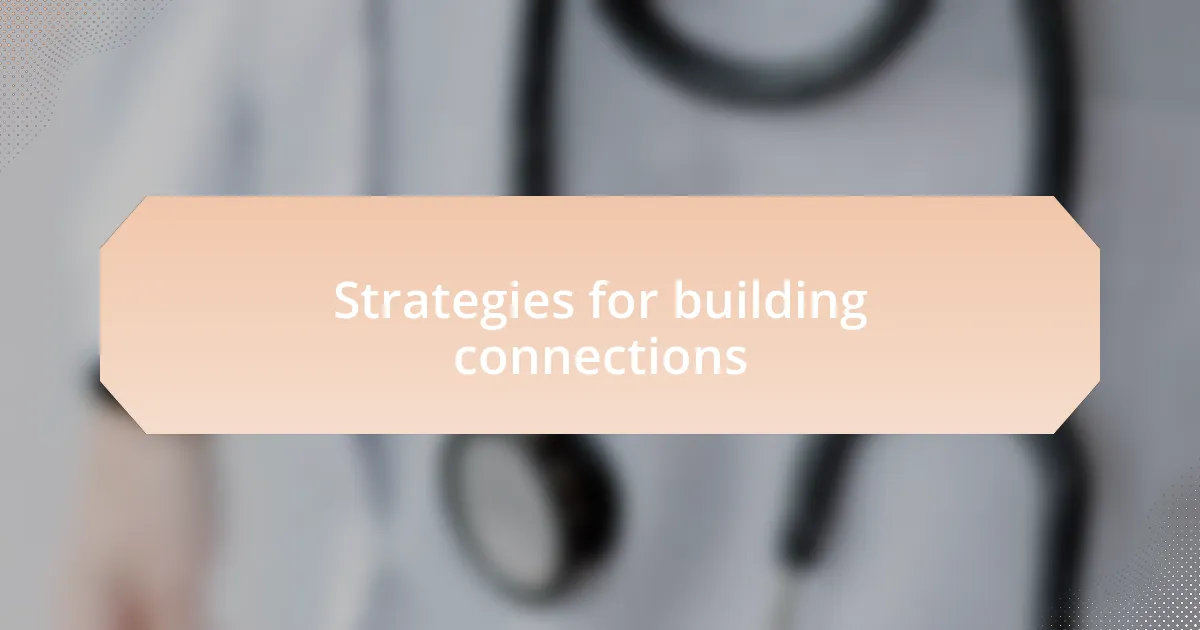
Strategies for building connections
To foster genuine connections within the community, one effective strategy is to create spaces where individuals can share their stories. I once organized a small gathering at my local church, inviting people from various backgrounds to talk about their experiences with healthcare. The room felt electric with emotion as voices came together, highlighting shared struggles and triumphs. Have you ever witnessed the bonding power of storytelling? It’s truly transformative.
Another approach is to partner with local organizations that already have strong ties to diverse groups. During a community event, I collaborated with a nearby nonprofit that supports immigrant families. Together, we offered health screenings and workshops, which not only brought resources to those in need but also deepened relationships between residents and healthcare providers. It struck me how much more impactful our efforts became when we pooled our resources and knowledge.
Lastly, regular follow-up is key to maintaining these connections. After hosting a health fair, I reached out to participants for feedback through surveys and personal chats. This not only helped me understand their ongoing needs but also showed them that their opinions mattered. Don’t underestimate the power of a simple check-in; it reinforces the idea that we are in this journey together, building a truly inclusive community.
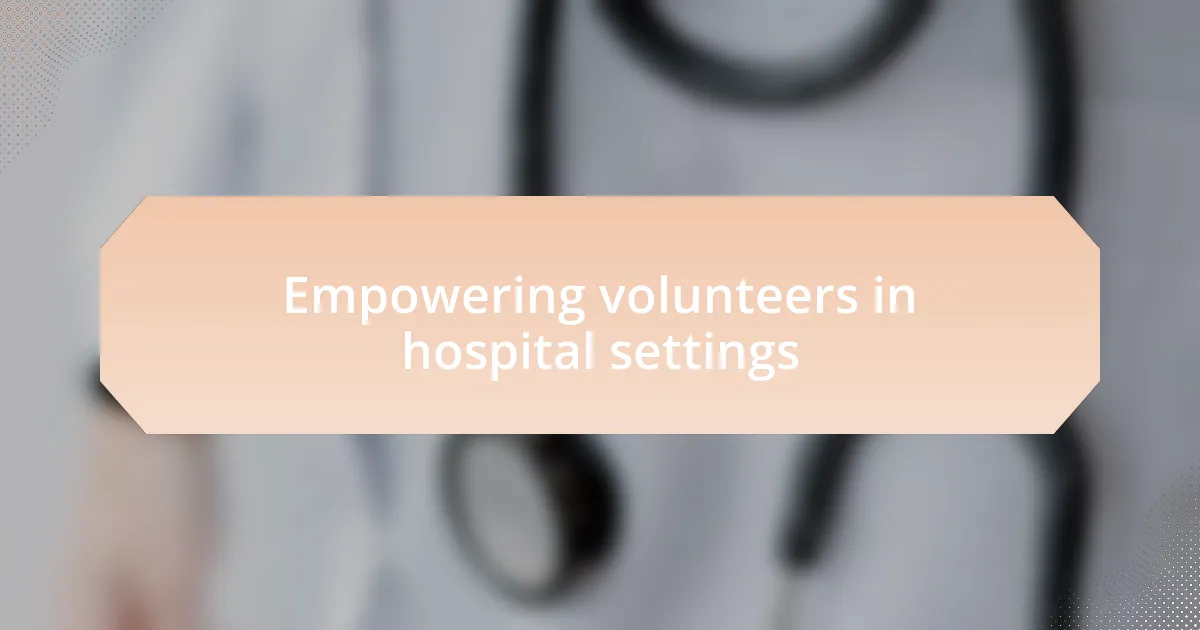
Empowering volunteers in hospital settings
Empowering volunteers within hospital settings starts with equipping them with the necessary skills and confidence. I remember during my time volunteering at a local hospital, we underwent training that not only taught us about patient care but also the importance of active listening. There’s something profound about being able to sit and truly hear a patient’s concerns; it changed the way I interacted with them. Have you ever noticed how a simple acknowledgment can make someone feel seen and valued?
Moreover, creating a supportive environment for volunteers can enhance their sense of belonging. At one point, our team established a mentoring system, pairing seasoned volunteers with newcomers. I found that this not only fostered camaraderie but also allowed us to share invaluable experiences and insights. Watching volunteers grow into confident advocates for patients has been one of the most rewarding aspects of my involvement.
Lastly, recognizing and celebrating volunteers’ contributions goes a long way in boosting morale. I cherished moments when our hospital held appreciation events, bringing together volunteers to share their stories and successes. Those gatherings were filled with laughter and heartfelt gratitude. Doesn’t it feel great to know that your efforts are acknowledged? This practice not only encourages volunteers to continue their service but also strengthens the bonds within the community.
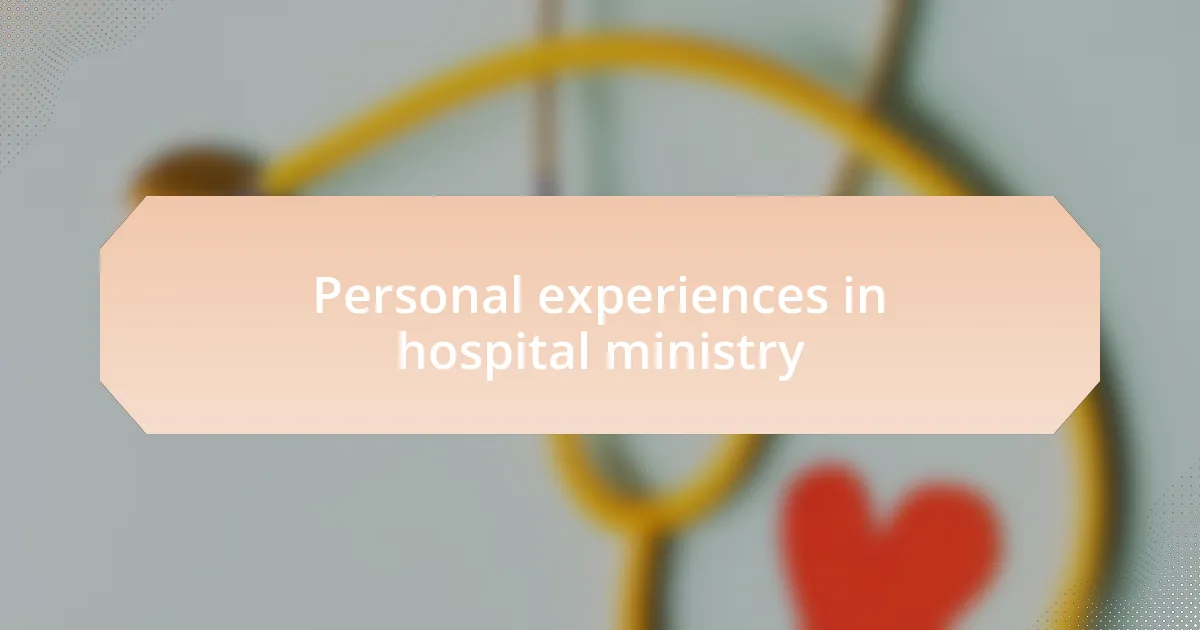
Personal experiences in hospital ministry
During my time in hospital ministry, I often encountered moments that reminded me of the profound impact a simple act of kindness can have. One day, I sat with a patient who was having an especially difficult time. As I held her hand and listened to her fears, I could see the tension in her face soften. It’s amazing how a small gesture, like being present and caring, can shift someone’s emotional landscape, don’t you think?
I recall visiting a pediatric ward, where bright stickers and cheerful drawings adorned the walls, but behind that cheerfulness were children enduring painful treatments. I remember one little boy who was afraid of his upcoming procedure. I kneeled beside him, shared a silly story, and made him laugh. At that moment, I realized how connection can not only ease pain but also ignite hope in the heart of a young patient. Isn’t it incredible how a genuine laugh can change the atmosphere?
One of my most memorable experiences came when I participated in a grief support group for families. The stories shared were raw and often heartbreaking, but I felt honored to be there as a listener and a source of support. Just being present during those vulnerable conversations highlighted for me the importance of community and empathy. How can any of us build inclusive spaces if we do not first learn to listen and hold space for one another?

Future goals for inclusive communities
When I think about future goals for inclusive communities, I envision spaces where everyone feels truly valued. For instance, in a recent team meeting at our hospital ministry, we discussed integrating feedback from all community members, especially those often overlooked. This is about more than just surveys; it’s about creating an environment where every voice, regardless of background, is not just heard but actively shapes our direction. Have you ever considered how often we take input for granted?
One particularly inspiring initiative I encountered aimed at training volunteers in cultural competence. This program fostered understanding and respect among individuals from diverse backgrounds, transforming the way care is delivered. Seeing the volunteers engage deeply with patients from various cultures highlighted the profound impact of such training. It’s a reminder of how education can be a catalyst for empathy and unity. Wouldn’t it be amazing if all communities adopted similar approaches to break down barriers and foster inclusivity?
Looking ahead, I believe it’s crucial to support mental health resources tailored for marginalized populations. During a discussion with a local mental health advocate, I learned about the unique challenges faced by these communities, often exacerbated by stigma and access issues. Their stories resonated with me and reinforced my belief that inclusivity means recognizing and addressing these disparities. How can we claim to be an inclusive community without actively working to uplift every member?